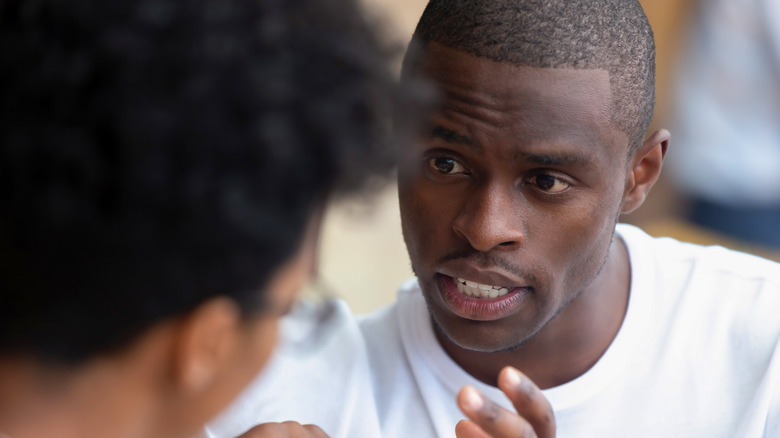Here's The First Thing You Should Do If You Think Your Partner Is Cheating On You - Exclusive
While falling in love with someone is natural and a rather smooth process, according to Psychology Today, maintaining a romantic relationship takes a lot of effort. Despite how happy and perfect a couple might appear to be, all relationships undergo different stages to grow and progress.
During a course of a relationship, especially in the beginning, most people are totally in love with each other. But with the passage of time, boredom, monotony, and a lack of spark could drive people apart (via Marriage). While it's normal for all couples to experience the ups and downs of a relationship, certain unacceptable behaviors and actions, such as infidelity, could result in painful breakups and divorces.
As explained by Couples Academy, unlike in the past when cheating was confined to the physical realm, the arrival of social media, dating apps, and VR sex games have made things quite complicated. Under such circumstances, most people are clueless about how to react if they suspect their partners are cheating on them. Fortunately, Dr. Talal Alsaleem, PsyD, LMFT — an award-winning infidelity expert — has some tips for the readers of The List about how to deal with a cheating partner.
Bring up your observations
Communication is one of the most important aspects of a relationship. And as Better Health points out, a healthy way of communicating your needs and desires with your significant other could not only allow you to deal with conflicts more easily but could also contribute to building a "stronger and healthier partnership."
According to Dr. Talal Alsaleem — who is also the author of the book "Infidelity: The Best Worst Thing that Could Happen to Your Marriage" — discussing your suspicions with your partner is the first thing you should do if you think they are not being faithful to you. "Bring up the observation or the discoveries that you have witnessed to make you suspicious of cheating," he told The List.
When it comes to observations, Prevention quoted therapists as saying that whether your partner is physically or emotionally cheating on you, the signs are often subtle. Therefore, they could be easy to miss. But if you have observed a sudden change in their behavior or routine, for example, being honest with them about your feelings would be the best bet.
Don't jump to conclusions
As explained by Psychology Today, irrespective of the dynamics of a relationship, being cheated on by your spouse or partner could be a very painful experience and an emotional roller coaster ride. Once you start suspecting that your partner is not faithful to you any longer, it could push you into a state of self-doubt.
As a result, your self-esteem could plummet and greatly add to your misery. Psychology Today further adds that the thoughts of your loved one being with someone else could make you feel unworthy and unloved, which could ultimately make you depressed as well.
To prevent this from happening, Dr. Talal Alsaleem not only suggests you share your observations with your partner but also avoid jumping to conclusions without listening to their side of the story. "It's important to bring up your observations and not your assumptions or conclusions," he told The List, adding that discussing the situation with your partner may even prove your suspicions wrong. "This will allow your partner the opportunity to explain their suspicious behavior which may not be signs of actual infidelity."
Let your partner explain
If you suspect that your romantic partner is cheating on you, you may feel angry and betrayed. What's more, in an emotional state, you might not want to believe them even if they are trying to come clean. In her 2009 article, "Why did You Hurt Me?" Victim's Interpersonal Betrayal Attribution and Trust Implications," researcher MeowLan Evelyn Chan explains that when a person feels betrayed, they may typically respond through "retaliation, reduction in trust, distrust or suspicion, increase in monitoring, negative emotions including anger, disappointment, and frustration, and deterioration in the quality or even termination of the relationship," among others.
Dealing with the situation with the help of the aforementioned responses could further damage your relationship with your partner. Therefore, Dr. Talal Alsaleem stresses allowing your partner to explain their point of view so that they could address your concerns. "It's their burden to provide a clear explanation that addresses your suspicion," he said.
The infidelity expert further added that in case your partner fails to come up with a satisfactory explanation, then you "need to seek the help of an experienced infidelity counselor to help the two of you get to the bottom of these observations."
Delve deeper into the issue
As suggested by Dr. Talal Alsaleem, seeking the help of an infidelity counselor will allow you to look at the issue from all perspectives. At the same time, the practice will likely enable your partner to open up about their thoughts and behaviors as well. As aforementioned, when you are talking to your partner in private, emotions could take the better of you and your reaction might prompt them to adopt a defensive stance instead of them trying to explain why they behaved in a certain manner to arouse your suspicions. But as Good Therapy points out, seeking the help of a professional could help you and your partner express your thoughts in a better way as they are good listeners.
For example, a counselor — after listening to both sides of the story — could clarify what kind of relationship you share with your partner. Professionals may also allow you to openly discuss the strengths and weaknesses of your relationship, while also talking about unhealthy patterns (via Good Therapy).
What's more, they could also help victims of infidelity work through self-blame. According to Dr. Alsaleem, doing so will "allow the two of you to determine whether or not what is taking place meets the threshold of the definition of infidelity."
Process what happened
Once you have spoken to your partner about your suspicions, allowed them to provide you with an explanation of their behavior, sought the help of a professional, and have established that your partner was, indeed, cheating on you, the last step — according to Dr. Talal Alsaleem — is to process what happened. "If it's infidelity, then you need to process what happened, why it happened, [and] assess the damage," he told The List.
According to Choosing Therapy, coming out of the suspicion phase and accepting that your partner had been cheating on you could be traumatic. But once you have learned why your partner cheated, you can then decide the future course of action regarding your relationship. "Decide on whether or not to repair the relationship or heal individually," Dr. Alsaleem said.
On his website, Dr. Alsaleem — who is touted as the "father of modern infidelity counseling" — also stresses that even if you are undergoing the trauma of infidelity, it does not define the rest of your life. "The courageous journey of healing will unlock the door to the happily ever after you've been seeking," he noted.





